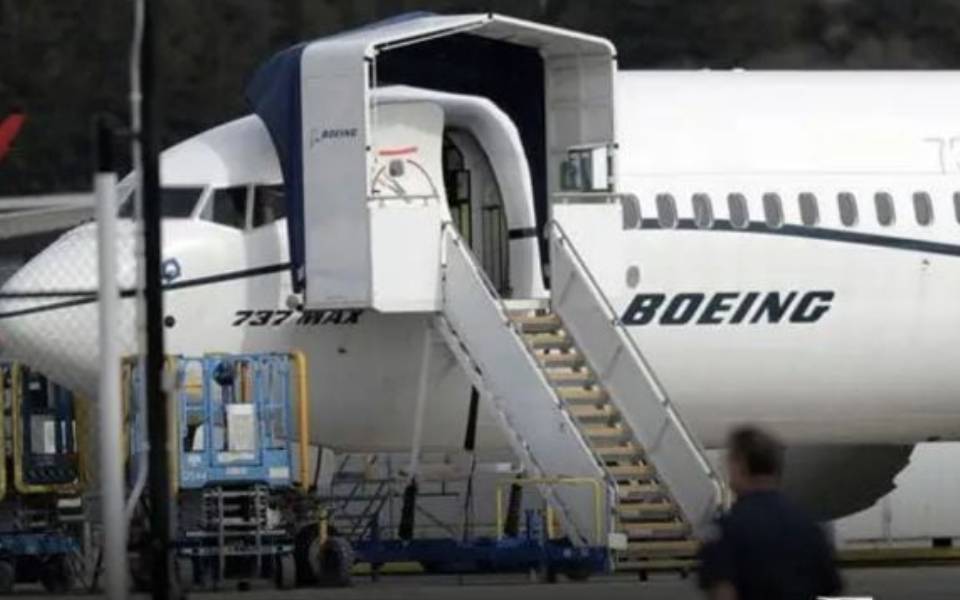Washington, Feb 5: Boeing reported another problem with fuselages on its 737 jets that might delay deliveries of about 50 aircraft in the latest quality gaffe to plague the manufacturer.
Boeing Commercial Airplanes CEO Stan Deal said in a letter to Boeing staff seen Monday that a worker at its supplier discovered misdrilled holes in fuselages. Spirit AeroSystems, based in Wichita, Kansas, makes a large part of the fuselages on Boeing Max jets.
"While this potential condition is not an immediate safety issue and all 737s can continue operating safely, we currently believe we will have to perform rework on about 50 undelivered planes," Deal said in the letter to employees shared with the media.
The problem was discovered by an employee of the supplier of the fuselages who notified his manager that two holes might have not been drilled according to specifications, Deal said.
Both Boeing and Spirit AeroSystems are facing intense scrutiny over the quality of their work after an Alaska Airlines 737 Max 9 was forced to make an emergency landing on Jan 5 when a panel called a door plug blew out of the side of the plane shortly after takeoff from Portland, Oregon.
The NTSB is investigating the accident, while the Federal Aviation Administration investigates whether Boeing and its suppliers followed quality-control procedures.
Alaska Airlines and United Airlines, the only other US airline flying the Max 9, reported finding loose hardware in door plugs of other planes they inspected after the accident. The FAA grounded all Max 9s in the US the day after the blowout. Two weeks later, the agency approved the inspection and maintenance process to return the planes to flying.
Alaska Airlines and United Airlines have begun returning some to service.
Boeing, based in Renton, Washington, said last week it was withdrawing a request for a safety exemption needed to certify a new, smaller model of the 737 Max airliner. Boeing asked federal regulators late last year to allow delivery of its 737 Max 7 airliner to customers even though it does not meet a safety standard designed to prevent part of the engine housing from overheating and breaking off during flight.
Let the Truth be known. If you read VB and like VB, please be a VB Supporter and Help us deliver the Truth to one and all.
Kolkata (PTI): What was meant to be a once-in-a-lifetime musical tribute to football legend Lionel Messi turned into a harrowing experience for London-based Indian singer Charles Antony, who flew to the country specially to perform at the event at Salt Lake stadium here.
Antony, a Malayali who sings in 18 languages, including Bengali, had composed a special Spanish song for Messi to welcome him in Kolkata, but was not able to sing that as he ran for his life amid chaos during the December 13 event at the Vivekananda Yuba Bharati Krirangan here.
“I ran to save my life,” Antony told PTI, recalling how the celebration descended into mobocracy as crowd control collapsed inside the packed stadium.
Angry fans, many of whom had paid Rs 4,000 to Rs 12,000 — and in some cases up to Rs 20,000 in the black market — ran riot at the venue after failing to get even a glimpse of their favourite superstar from Argentina.
ALSO READ: Madhya Pradesh: BJP leader assaults blind woman in Church
“I had barely seen him. He was smiling, but it was very clear he was uncomfortable,” Antony vividly recalled, even after 10 days had passed.
Positioned on the running tracks near the gallery, the singer was waiting for Messi to complete his lap around the ground when the situation worsened.
Antony saw Messi, his long-time strike partner Luis Suárez and Argentine teammate Rodrigo De Paul being surrounded by many people.
He noticed water bottles, food packets, stones and metal objects being hurled from the gallery. Equipment was on the verge of being damaged, and panic had set in.
“I was lucky I was not injured, and none of my equipment was damaged,” he said.
The singer said there was confusion over reporting time, with instructions given to reach the venue at both 10.30 am and 9.30 am on December 13 for a sound check, and he had not had the opportunity to visit the stadium the previous day.
Personally invited by now-arrested event organiser Satadru Dutta to sing at the Messi events in Kolkata, Mumbai and New Delhi, Antony had travelled from London and was staying at the Hyatt Hotel here.
Having sung in the presence of Diego Maradona during his visit to Kolkata in 2016, an experience Antony describes as joyous and perfectly managed, the contrast was stark.
“When Maradona came to Kolkata in 2016, I was inside the inner circle. Nothing went wrong then. This time, I was outside the core circle," he said.
Antony said the size of the crowd, on both occasions, was huge.
“This is the first time in my life I saw nearly one lakh people in one place. Luckily, I got the chance to sing a couple of songs at the event. Otherwise, it would have been a waste of travelling all the way from London. And now, I have become the first Indian to sing with Maradona and for Messi," he said.
Antony said people began storming the ground after VVIPs were escorted through an underground exit and former India cricket captain Sourav Ganguly left the stadium.
“That’s when the police told me to run to a safe place,” he said.
With no assistance from anyone, the singer grabbed whatever he could, his guitar, cables, mouth organs, and vocal processors, stuffing them into bags.
“Everyone was worried about the VVIPs. Nobody was concerned about my safety,” he said.
With his access tag still hanging around his neck, Antony felt even more vulnerable on that day.
“People misjudged me as one of the organisers. At one point, my life was under threat,” he said.
Police advised him to move towards the centre of the ground to avoid attacks from the galleries, he said.
Eventually, Antony ran all the way back to the hotel, later shifting to another hotel for safety.
“I had no time to look for anyone else. I ran to save my life,” he said.
In the aftermath, Antony tried repeatedly to contact Satadru Dutta to understand what would happen next, but could not reach him.
“There was complete uncertainty. I was getting very agitated,” he admitted.
He also witnessed the heartbreak of fans.
ALSO READ: Unnao rape case: Delhi High Court suspends Kuldeep Sengar’s sentence, grants bail
“People had come from Meghalaya, Assam, Bengaluru just to see Messi. They couldn’t even see Messi and were very disappointed. and I saw many crying,” he said.
Antony clarified that he did not take any remuneration for the performances. The organisers only covered his travel costs from London and his accommodation in India.
Despite the ordeal, he refused to single out Satadru, the organiser, for mismanagement at the stadium.
“I don’t believe Satadru is solely responsible. He (Satadru) tried his best to stop people from coming close to Messi. But some others, possibly VVIPs, were taking selfies. He was visibly helpless. Everything went out of control,” Antony said.
For the singer, the day remains a painful memory, not just because he couldn’t sing for Messi, but because what should have been a celebration of football turned into a fight for survival.





